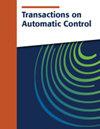网络系统抗窃听的安全递归状态估计:一种部分加解密方法
IF 7
1区 计算机科学
Q1 AUTOMATION & CONTROL SYSTEMS
引用次数: 0
摘要
本文研究了网络线性系统的安全递归状态估计问题,该系统传输的测量数据容易被窃听者截获。为了有效地保护信息安全,可以采用一种基于加密-解密的通信方案,但是对来自传感器的所有测量数据进行加密会导致大量的计算成本。针对这一问题,提出了一种局部加密解密机制,以较低的计算成本提高信息安全性。在该机制中,只对传输的部分测量信号进行加密,其余信号直接传输给估计器。提出了一种基于jordan -canonical-form的PED机构参数选择方法,并基于最小均方误差原理设计了状态估计器的递推公式。给出了估计误差方差矩阵最终有界的充分条件。最后,通过两个仿真实例对所提出的基于ped的递归状态估计方案进行了评价,验证了其有效性。本文章由计算机程序翻译,如有差异,请以英文原文为准。
Secure Recursive State Estimation of Networked Systems Against Eavesdropping: A Partial-Encryption-Decryption Method
This article addresses the problem of secure recursive state estimation for a networked linear system, which may be vulnerable to interception of transmitted measurement data by eavesdroppers. To effectively protect information security, an encryption-decryption-based communication scheme can be used, but encrypting all the measurement data from sensors can result in significant computational costs. To address this issue, a partial-encryption-decryption (PED) mechanism is proposed to enhance information security with relatively low computational costs. In this mechanism, only part of the transmitted measurement signals are encrypted, and the remaining signals are transmitted directly to the estimator. A Jordan-canonical-form-based approach is developed to select the appropriate parameter for the PED mechanism, and recursive formulas for the state estimator are designed based on the principle of minimum mean squared error. Sufficient conditions are derived to guarantee the ultimate boundedness of the estimation error variance matrix. Finally, the proposed PED-based recursive state estimation scheme is evaluated through two simulation examples to demonstrate its effectiveness.
求助全文
通过发布文献求助,成功后即可免费获取论文全文。
去求助
来源期刊

IEEE Transactions on Automatic Control
工程技术-工程:电子与电气
CiteScore
11.30
自引率
5.90%
发文量
824
审稿时长
9 months
期刊介绍:
In the IEEE Transactions on Automatic Control, the IEEE Control Systems Society publishes high-quality papers on the theory, design, and applications of control engineering. Two types of contributions are regularly considered:
1) Papers: Presentation of significant research, development, or application of control concepts.
2) Technical Notes and Correspondence: Brief technical notes, comments on published areas or established control topics, corrections to papers and notes published in the Transactions.
In addition, special papers (tutorials, surveys, and perspectives on the theory and applications of control systems topics) are solicited.
 求助内容:
求助内容: 应助结果提醒方式:
应助结果提醒方式:


